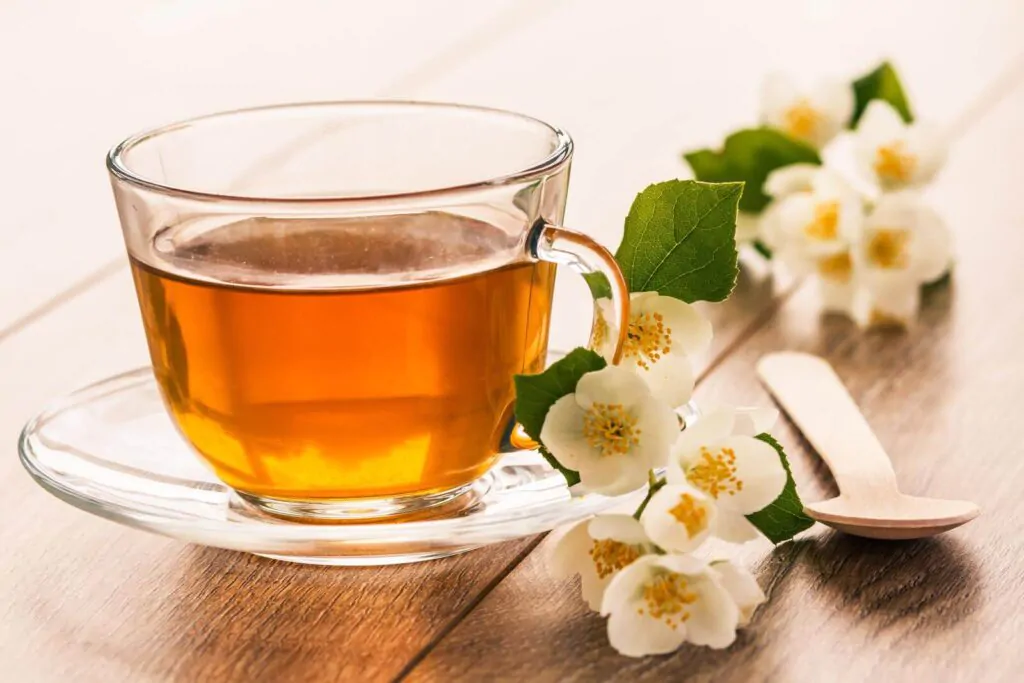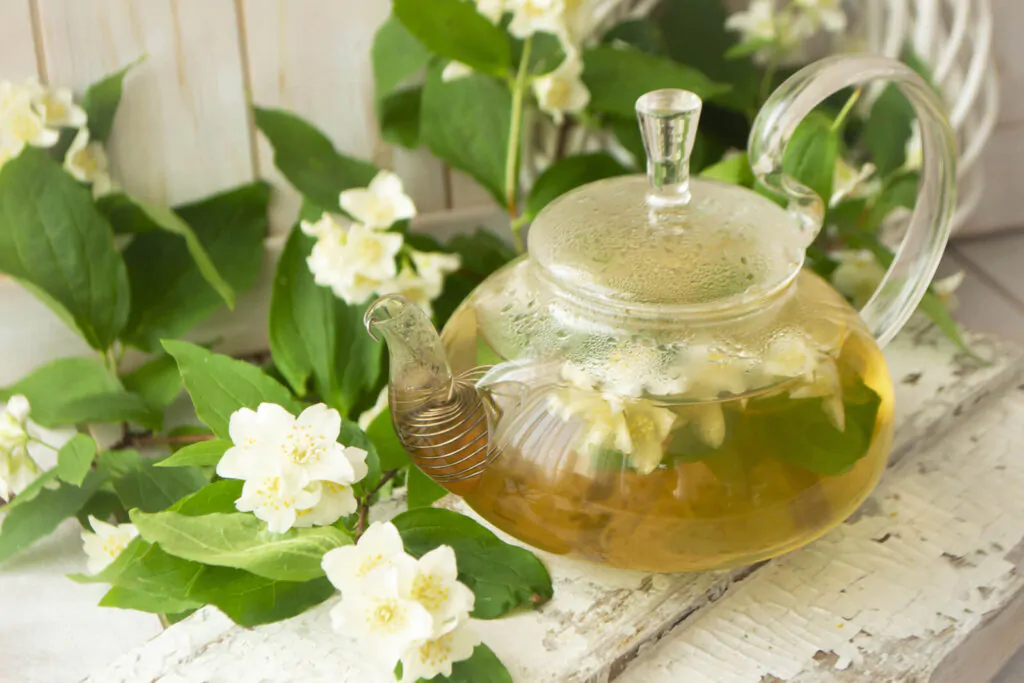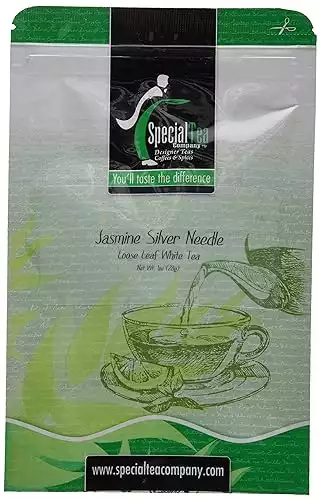While it is true that jasmine blossoms do not contain caffeine, is jasmine tea caffeinated? Keep reading to find out.

Jasmine flowers are naturally caffeine-free, so pure jasmine tea does not contain caffeine. You will often find jasmine tea mixed with other kinds of tea which can up the caffeine content and alter the taste.
Jasmine tea is also known as scented, flavored, or blended tea. Since all true teas from the Camellia sinensis plant are caffeinated, jasmine tea made from these teas will also have caffeine. Depending on the tea you use to make jasmine tea, you can expect the caffeine content to range from 20 to 60 mg per cup.
Tea’s caffeine content depends on several factors, including tea varietal, growing conditions, brewing method, and processing methods. Steeping for one minute will produce half as much caffeine as steeping tea for three minutes. In addition, teas with younger leaves, like Downy Jasmine Needle tea, has more caffeine content.
For example, Purple Jasmine, is a combination of jasmine green tea and rare purple tea. Purple tea does not have as much caffeine as green tea, and more antioxidants.
Herbal tea is not used often as a jasmine tea base — and like pure jasmine tea, the tea blend from this one will not have any caffeine, too.
What Is Jasmine Tea?
Jasmine tea is a tea usually made with green tea or white tea as its base. The authentic way to make jasmine tea is to mix tea leaves with fresh jasmine flowers until they are infused with the fragrance and remove them after. You only have to repeat this process several times, but you need a lot of flowers to do so.
Another way to make jasmine tea is to blend tea leaves with dry jasmine flowers — this will lower the cost of the tea, and also make it less fragrant and flavorful.
The most affordable way to make jasmine tea is with the use of artificial flavors. This tea blend can be delicious, but does not have the same benefits, taste, and scent like the real deal.
Fujian, Hunan, and Sichuan are all well-known provinces in China for producing high-quality jasmine teas.
Traditional Jasmine Tea
The traditional jasmine tea is made with green tea as its base, scented with jasmine flowers that might also include dried flowers as well. The tea leaves are scented with fresh jasmine flowers several times to provide a strong and noticeable scent and flavor. This tea is only brewed with natural flowers and ingredients.

Jasmine Dragon Pearl Green Tea
The Jasmine Dragon Pearl Green tea is the most beautiful type of jasmine tea. Tea leaves are scented with jasmine flowers and then rolled into little tight balls.
It is often mistaken for white tea because it is made using younger buds and leaves covered with fine white hair. Black and white varieties can be made as well.
Jasmine Silver Needle White Tea
As the name suggests, this type of jasmine tea is made from Silver Needle white tea. The high quality teas are made using plumper buds covered with more white hair and trace amounts of jasmine flowers. Instead of being blended, this tea is scented.
Other types of jasmine tea have smaller buds covered with less white hair and lots of jasmine flowers. It’s more of a blend, than a scented tea.
Jasmine Tea Regions
China is the most popular jasmine tea producer but is not the only one.
For example, Japan also produces jasmine tea, but it is typically has a base of Chinese green tea. Sencha tea can also be used as a base, but it is quite rarer than other tea types. Its flavor profile is more appropriate when it comes to combining with other ingredients.
Indian, Thai, and Vietnamese teas are more similar to Chinese teas compared to Japanese teas, so they are also a great base for adding scent.
Is Jasmine Tea Green Tea?
Jasmine tea is not always made with green tea as its base, but this is the most common brew Green oolong is an excellent option for scenting. Black jasmine tea is very common nowadays too — the stronger flavor of black tea makes the flowers pop.
Herbal jasmine tea is typically made by blending jasmine with rooibos tea.
You may also be interested in reading our jasmine tea vs. green tea guide.
How To Brew Jasmine Tea
Jasmine tea is commonly made with green tea as its base, but it can also be made with:
- Black tea (fully oxidized)
- Oolong tea (semi-oxidized)
- White tea (made from younger buds and leaves)
You can make jasmine tea at home by simply blending the tea of your choice with freshly picked jasmine flowers, but buying dried tea or tea bags is easier. Some varieties of jasmine flowers are toxic, so buying from a reputable tea company is best rather than making your own using the flowers from your garden.
Cold Brew Iced Tea
Step 1: Infuse Tea & Water
Put your loose leaf tea or tea bag in a pitcher.
Pour some water into the pitcher. Cover and let the tea steep for six to 12 hours at room temperature.
Step 2: Strain
Strain the loose leaf tea or remove the tea bag.
Step 3: Serve
Pour the drink into your teacup, add ice, and enjoy!
You can add some sugar, honey, or milk to your jasmine tea.
You may also be interested in reading our tea strainer vs. tea infuser guide.
5 Health Benefits Of Jasmine Tea
Here are some research-backed health benefits of drinking jasmine tea:
1. It Helps Improve Focus
As you may already know, teas made from the Camellia sinensis plant have stimulating and calming effects. These benefits are due to the relatively low caffeine content of the tea, combined with the natural amino acid l-theanine.
Jasmine tea, made from green tea and black tea specifically, is full of l-theanine. Studies have shown that l-theanine can increase alpha brain wave activity, which induces the feeling of relaxation. It also supports a healthier stress response.
In addition, drinking tea allows you to focus without feeling jittery, unlike coffee. It contains just the right amount of caffeine to pick you up and set you down gently with little to no crash. Some research also suggests that jasmine tea does a better job of reducing stress than most true teas.

Furthermore, the jasmine petals make this tea high in linalool, a chemical compound responsible for the floral scent you can smell whenever you brew or drink jasmine tea. The smell of linalool is not just pleasant; it may even have a calming effect, according to studies.
So, don’t forget to inhale as you take a sip of your jasmine tea, especially if you’re having a bad day!
2. It Helps Promote Healthy Skin
Healthy skin means beautiful skin, and jasmine tea may help promote healthy skin in several ways. For example, the polyphenols in tea act as antioxidants to help support healthy aging, which helps you maintain a younger appearance.
Nevertheless, the jasmine petals also have powerful anti-aging properties on their own. According to studies, some components in jasmine flowers may detoxify while promoting your skin’s natural ability to heal itself.
Most studies on jasmine’s benefits for skin health focused on its topical effects, suggesting that concentrated jasmine tea may also be an ideal complement to skincare products. So, whether you drink or scrub it, your skin will benefit from jasmine tea!
3. It Helps Support Healthy Cells
The most common base for jasmine tea – green tea – is high in polyphenols and catechins like Epigallocatechin gallate (EGCG), which supports cellular health.
In addition to the health-promoting compounds present in tea, jasmine tea also has additional free radical scavengers thanks to the jasmine petals. This means that jasmine tea is an excellent choice if you want tea with more antioxidants than most true teas.
4. It Helps Lower Cholesterol Levels
Up to 17 clinical trials have shown that green tea may help lower cholesterol levels. Additionally, animal studies showed that jasmine tea and Chinese green tea were the best teas for lowering cholesterol levels.
Unique jasmine antioxidants may also improve the ability of jasmine tea to maintain healthy cholesterol levels even further. However, more research is needed.
5. It Helps Improve Gut Health
Drinking tea may improve gut health, as some polyphenols act as prebiotics, which help nourish your microbiome by feeding the gut bacteria. In addition, it may also help support your body’s natural anti-inflammatory response, including your gut.
Some animal studies show that jasmine may help improve the ability of your body to maintain a healthy gut by promoting high levels of natural antioxidants, but more research is needed.


